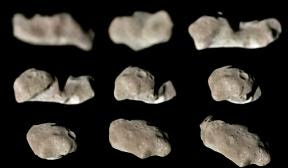

If the darkened room in which you were standing was suddenly illuminated and it became apparent someone had been throwing rocks in your direction, wouldn't you want to do something about it? Just because we happened to have not personally experienced it, we tend to dismiss the fact that big objects have been slamming into the earth since its formation. Its just dumb luck that humans have not yet been wiped out by one of the many asteroids or comets that regularly cross our orbit. Instead of focusing our collective efforts and resources on saving our asses, we indulge in self gratification and the petty distractions of make believe problems.
Chapter 13 "Bang!" of Bill Bryson's "A Short History of Nearly Everything" addresses the issue of cosmic objects colliding with earth... past, present and future. I've been concerned before about the possibility of death by asteroid but I was struck with terror at the prospect as it was presented by Mr. Bryson. He paints a detailed hypothetical picture of the destruction we might expect from collision with one of the many thousands of known asteroids of our solar system that are in potentially earth threatening irregular orbits. He also explains that unexpected instant destruction may not be all that hypothetical since one of the few things astronomers know about the actual numbers of potential earth killers is that there are a lot more of them than they have actually counted. My concerns were only further inflamed by an old New Yorker article on the subject which was just as alarming. Add to my unease a few random television documentaries that were at least as sensational if not as credible as Bryson, the New Yorker and NASA.
The concept of instant, world-wide devastation would be easier for me to live with if I thought there was nothing that could be done about it… there is a point we all have to resign to fate and relax. However, I'm bothered by the possibility that there are resources we are not employing in averting our total destruction. I was somewhat relieved to find that an effort is being made, by those with minds sharper than mine, to find near earth objects that could hit us. Hopefully they are as worried as I am, otherwise there will just not be the necessary motivation to hunt down the enemy. It seems people tend to focus on problems they can take direct action against; global warming, war, famine, and other well known crises. Of course these are all worthy things to struggle against, but no matter the scale, they ultimately deal with individual death and suffering. All other problems pale in comparison to the prospect of a globally catastrophic asteroid impact that could end human civilization. The numerous ways in which my own life could be unexpectedly extinguished aren't nearly as disturbing as the thought of everyone simultaneously biting the dust. For whatever reasons, I'm comforted by the idea of people being left after I go.
Asteroid impact remains the most likely scenario for the dinosaurs' extinction. The difference between us and the dinosaurs is that we, just recently, have started to develop the ability to protect ourselves. The recent asteroid landing was a step in the right direction, as was the Hubble telescope's documenting of the comet Shoemaker/Levey smacking into Jupiter. If continuing our species history of exploration is not enough reason to support the space program, then is just continuing our species history reason enough?
No comments:
Post a Comment